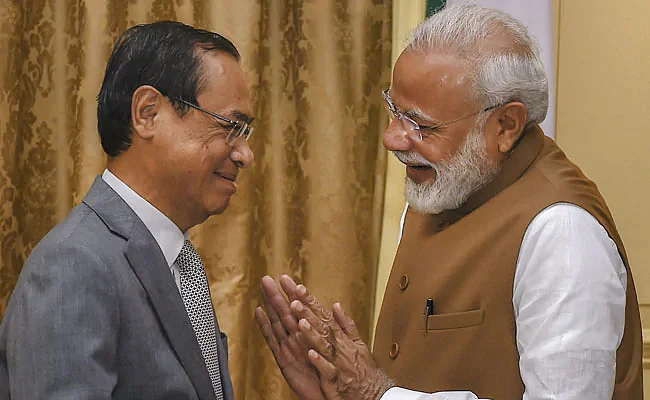Former Chief Justice of India Ranjan Gogoi, who headed benches that pronounced several key judgements including in the sensitive Ayodhya land dispute case, was on Monday nominated to Rajya Sabha by the government.
Gogoi also led the benches that ruled on matters like Rafale fighter jet deal and entry of women in Sabarimala temple.
A notification announcing his nomination to the Upper House was issued by the Ministry of Home Affairs on Monday night.
"In exercise of the powers conferred by sub-clause (a) of clause (1) of article 80 of the Constitution of India, read with clause (3) of that article, the President is pleased to nominate Shri Ranjan Gogoi to the Council of States to fill the vacancy caused due to the retirement of one of the nominated members," the notification said.
The vacancy was created due to retirement of KTS Tulsi.
Gogoi (65) retired as CJI in November last year after a tenure of a little over 13 months.
He will be the first former Chief Justice of India to be nominated to Rajya Sabha by the President. However, he's not the first CJI to be nominated to Rajya Sabha.
Justice Ranganath Misra -
He served as Chief Justice from September 1990 to November 1992.
Former Chief Justice Ranganath Misra was also a Rajya Sabha member but he was elected on a Congress party ticket. Interestingly, he was the sole member of the Misra Commission of Inquiry into the 1984 anti-Sikh riots which was deemed ‘biased’ by a former General Officer Commanding-in-Chief of the Indian Army, LT General Aurora, against the victims. He indicted 19 workers of abetting the riots but gave the Congress party a clean chit.
In fact, independent observers had predicted it would be a ‘lame duck’ investigation.
Justice Tarkunde, who called the Father of Civil Liberty movement had noted: "This has been a one sided investigation. We were never really given a chance to participate in it as we had been promised.”
LT General Aurora had said: “The terms of reference of the commission were biased against the victims, the victims were forced to come to the investigation with the burden of proof on them."
He was also the Chief Scout of the All India Boys Scouts Association since 1992, first Chairman of the National Human Rights Commission of India in 1993 and a member of the Rajya Sabha on a Congress ticket from 1998 to 2004.
Interestingly, his nephew Justice Dipak Misra would also become the CJI.
Gogoi’s tenure

Justice Gogoi and Narendra Modi | PTI
Gogoi will be remembered for the verdict in the Ram Janmabhoomi-Babri Masjid case that gave Hindus the 2.77 acre disputed land for construction of Ram Temple, and directed that Muslims be given a 5-acre land at a "prominent location" to build a mosque in the city.
His tenure as judge and as CJI was also marked by some controversies as he had faced allegations of sexual harassment, of which he was cleared.
He was among the four senior-most judges who held an unprecedented presser in January 2018 questioning the then CJI's way of functioning.
Later at a public function, Gogoi had remarked that "independent judges and noisy journalists are a democracy's first line of defence".
A bench headed by him gave clean chit to the Modi government twice -- first on the writ petition and then on the pleas seeking review of the December 14, 2018 verdict -- in the Rafale fighter jet deal with French firm Dassault Aviation.
The bench had warned Congress leader Rahul Gandhi for wrongly attributing certain remarks to the apex court in the Rafale case and asked him to be more careful in the future.
Besides, Gogoi headed a bench which in a landmark verdict held that the office of the CJI is a public authority under the Right to Information Act, but "judicial independence has to be kept in mind" while disclosing information in "public interest".
A five-judge Constitution bench headed by Gogoi struck down in entirety the rules formulated by the Centre on appointment and service conditions for members of various tribunals, and referred to a larger bench the issue of examining the validity of the passage of the Finance Act, 2017 as Money Bill.
He also led a bench which monitored the National Register of Citizens (NRC).
A lot of controversies plagued the NRC but Gogoi stood his ground and later came out in public defending the decision to hold the exercise to identify illegal immigrants.
As the CJI, he took tough decisions against erring judges and recommended their transfers and a woman high court judge was virtually forced to resign.
He also headed a bench which dealt with contempt proceedings against former apex court judge Markandey Katju for his remarks against judiciary in his blog.










